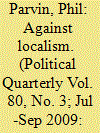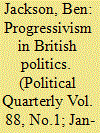|
|
|
Sort Order |
|
|
|
Items / Page
|
|
|
|
|
|
|
| Srl | Item |
| 1 |
ID:
092397


|
|
|
|
|
| Publication |
2009.
|
| Summary/Abstract |
The continued decline in levels of political engagement among British citizens has led many politicians, commentators and academics from across the political spectrum to advocate a move toward a more direct form of democracy via some kind of localism. The claim is that citizens feel increasingly estranged from the democratic process, and from those organisations on which they have historically relied to represent them within the political system. Consequently, localists argue, there now exists a gap between the people, the institutions which are supposed to work on their behalf, and the decisions made in their name, so the system needs to be reformed in such a way as to give individuals and local communities more of a direct input into the decision-making process. Calls for a more direct form of democracy via localism are popular among members of the progressive left and the 'new Conservative' right, and have become so dominant in political discourse that it is often suggested that 'we are all localists now'. This article raises questions about the localist agenda, and suggests that the adoption of a more direct form of democracy in Britain may not only fail to address the decline in political engagement, but may also result in the exclusion, marginalisation, and oppression of minority groups
|
|
|
|
|
|
|
|
|
|
|
|
|
|
|
|
| 2 |
ID:
192891


|
|
|
|
|
| Summary/Abstract |
Advocates of progressive political economy agree that the neo-liberal economic order has worsened environmental degradation, worker precarity, and oligarchy, but what are the alternatives? This article relates left-progressive discourses about concrete approaches and policy ideas to implications for the global economic order. While progressives explicitly seek a more social democratic global order, the various policy initiatives in the progressive imaginary implicitly involve approaches to order-building that are in scarcely acknowledged competition with one another. While neo-Keynesianism, justice for the Global South, a Global Green New Deal, and degrowth are all anti–neo-liberal approaches that pursue the same broad aims—reducing inequality within the Global North, raising standards of living and buffering structural violence in the Global South, and responding to the climate crisis—these goals potentially exhibit the tensions of a trilemma.
|
|
|
|
|
|
|
|
|
|
|
|
|
|
|
|
| 3 |
ID:
152557


|
|
|
|
|
| Summary/Abstract |
Attempts at a Labour–Liberal Democrat Progressive Alliance came to nothing prior to the 1997 general election. The original idea of progressivism, first mooted in Britain in 1896, was an American one. Suggestions for a progressive alliance in the UK came from Lloyd George in 1914, and then again in 1931, each time with little effect. Nothing emerged after 1945 until the Lib–Lab pact negotiated by Callaghan and Steel in 1977, which led to electoral misfortune for both and the rise and fall of the SDP. In 2010 a coalition between the Lib Dems (under Clegg) and the Conservatives was always much the more likely option. Most Labour people no longer saw the Lib Dems as a party of the left. The Coalition Agreement in 2010 showed the idea of an alliance to be a centrist, elitist one with little grass-roots support. Such an alliance would flourish through abstract pressure groups rather than popular democracy, especially with a Labour party led by Corbyn. In the US and the UK, progressivism went badly wrong in its politics: Theodore Roosevelt's New Nationalist campaign of 1912 divided American reformers fatally, as did Lloyd George's postwar Coalition in Britain after 1918. Now, even after Brexit, a progressive alliance seems further away than ever. The story of the ‘Progressive Dilemma’ remains one of unrealistic projects, invariably disappointed.
|
|
|
|
|
|
|
|
|
|
|
|
|
|
|
|
| 4 |
ID:
152558


|
|
|
|
|
| Summary/Abstract |
This article argues that a return to the history of progressive political thought can help us to think afresh about what a renewed centre-left politics might look like today. The article identifies some significant aspects of this history that attracted little attention in earlier debates over the British progressive tradition—in particular, debates about social ownership, nationalism and distributism. This revisionist history of British progressivism points the way towards some common ideological ground that could provide a starting point for a new dialogue between different ‘progressive’ political parties and interests.
|
|
|
|
|
|
|
|
|
|
|
|
|
|
|
|
| 5 |
ID:
131528


|
|
|
|
|
|
|
|